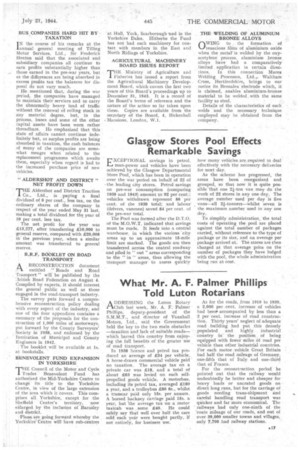Glasgow Stores Pool Effects Remarkable Savings
Page 19

If you've noticed an error in this article please click here to report it so we can fix it.
XCEPTIONAL savings in petrol, LA man-power and vehicles have been achieved by the Glasgow Departmental Store Pool, which has been in operation over the war period on behalf of 22 of
• the leading city stores. Petrol savings on pre-war consumption (comparing 1939 and 1943) amount to 92 per cent.: vehicles withdrawn represent 86 per cent, of the 1939 total; and labour (drivers, vanmen) saved 84 per cent. of the pre-war total.
The Pool was formed after the D.T.O. of the M.O.W.T. indicated that savings must be made. It feeds into a central warehouse, in which the various city areas up to an approximate 15-mile limit are marked. The goods are then transferred across the central roadway and piled in " out" areas corresponding to the "in " areas, thus allowing the transport manager to assess quickly how many vehicles are -required to deal effectively with the necessary deliveries for next day.
As the scheme has progressed, the areas have been reorganized and grouped, so that now it is quite possible that one 21-ton van may do the work of 22 stores in any one day. The average number used per day is five vans—all 21-tormers—whilst seven is the maximum number used in any one day.
To simplify administration, the total costs of operating the pool are placed against the total number of packages carried, without reference to the type of package or its size, and an average per package arrived at. The stores are then charged at that average price on the number of packages they have lodged with the pool, the whole administration being run at cost.




















































